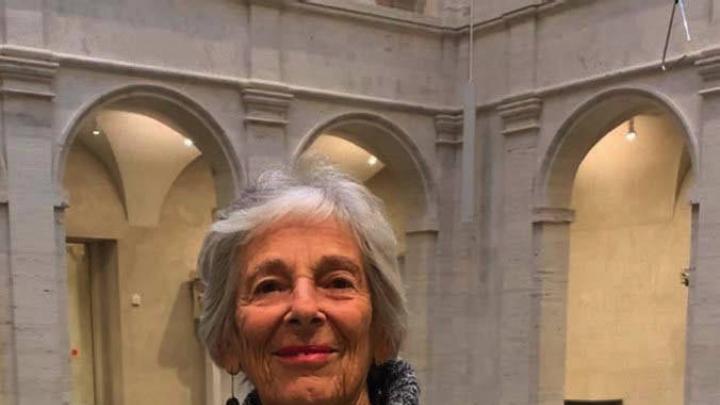Annette Samuels arrives 15 minutes early for “Tech Ethics” and takes a seat in her favorite section: first balcony, left side, overlooking the Klarman Hall auditorium stage. As class begins, students from the College, Business School, and Law School flow into the massive hall. “It’s very obvious who’s who,” Samuels confides. “The women at the B School wear leather shoes. Much fancier.” The ones wearing shorts in the freezing weather, she points out, are undergrads. She recognizes some from her other classes.
It’s very obvious who Samuels is, too. At 85 years old, the Radcliffe class of 1955 graduate is at least a half-century older than nearly everyone in the lecture hall. She beats out the freshmen by about two-thirds of a century.
But no one seems to notice. Samuels keeps to herself, and when the lecture starts, she takes judicious notes throughout, scribbling key ideas in her spiral notebook. She makes a few selective quips throughout, as when the guest lecturer, a Chinese scholar, evades a question about China’s social-credit system. For someone sitting in on her fourth class of the day, she’s pretty energetic.
Samuels married her husband, Bob, a Brandeis alumnus and varsity baseball player, on the day of her graduation, causing her to miss the ceremony. (They had to get it over with quickly, because they ran a summer camp together.) They moved to Israel in 1962, with an infant and two toddlers in tow. Bob, a reform rabbi, led congregations and also served for 37 years as headmaster for the Leo Baeck School in Haifa. Annette, a music concentrator, performed in orchestras and chamber groups as a violinist, and later was certified as an occupational therapist.
The couple always dreamed of returning to Boston to take classes. They’d live halfway between Brandeis and Harvard, making it easy to head their separate ways in the morning and reconvene at day’s end. In 2013, after a Harvard-Radcliffe Orchestra concert in Israel, Samuels approached music director Federico Cortese. “I told him, ‘I’m coming back to Harvard,’” she says. But in 2016, after 62 years of marriage, her husband passed away, and it took her a couple of years to get back on her feet. Finally, in 2018, she decided to fly to Boston alone for the fall semester. She felt she had more learning left to do. In 2019, she did the same.
On school days, Samuels has little time off. She heads to four class lectures a day—ranging from “How to Build a Habitable Planet,” to “Tech Ethics,” to “The Ancient Greek Hero: Mythology and Facing Death.” (“I do as much as I can,” she says of the many assigned readings.) If there’s a Radcliffe seminar scheduled, she’ll try to attend that as well. After a brief, six-decade hiatus, she also re-joined the Harvard-Radcliffe Orchestra, playing a violin her son David gave her for her sixtieth birthday. “I think the people in the orchestra were surprised to see an old grandma,” she jokes. But when the orchestra performed Mahler’s Ninth Symphony, a monumental work that required three two-and-a-half hour rehearsals per week, she was part of the ensemble.
Samuels says that as an auditor, “I’m not contributing. I’m just getting here. I’m really thankful for the professors who don’t frown at me, and let me sit in their classes.” But sitting near an octogenarian who traveled about 5,400 miles for class makes taking things for granted a bit more difficult. “Life is different, music is different,” Samuels says. “But we still play Bach and Schumann and Mahler. I think everyone should do this. It’s what keeps you young.”









